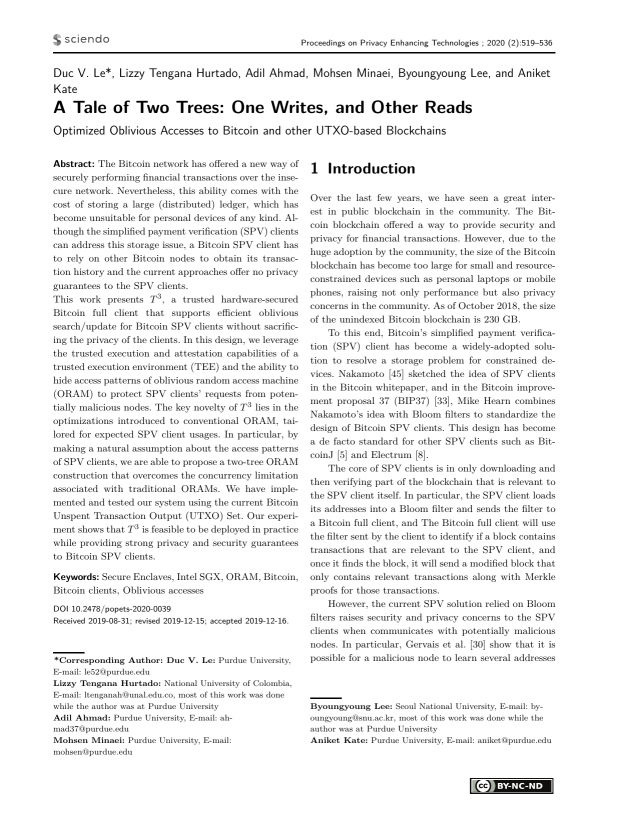A Tale of Two Trees: One Writes, and Other Reads
Authors: Duc V. Le (Purdue University), Lizzy Tengana Hurtado (National University of Colombia), Adil Ahmad (Purdue University), Mohsen Minaei (Purdue University), Byoungyoung Lee (Seoul National University), Aniket Kate (Purdue University)
Volume: 2020
Issue: 2
Pages: 519–536
DOI: https://doi.org/10.2478/popets-2020-0039
Abstract: The Bitcoin network has offered a new way of securely performing financial transactions over the insecure network. Nevertheless, this ability comes with the cost of storing a large (distributed) ledger, which has become unsuitable for personal devices of any kind. Although the simplified payment verification (SPV) clients can address this storage issue, a Bitcoin SPV client has to rely on other Bitcoin nodes to obtain its transaction history and the current approaches offer no privacy guarantees to the SPV clients. This work presents T 3 , a trusted hardware-secured Bitcoin full client that supports efficient oblivious search/update for Bitcoin SPV clients without sacrificing the privacy of the clients. In this design, we leverage the trusted execution and attestation capabilities of a trusted execution environment (TEE) and the ability to hide access patterns of oblivious random access machine (ORAM) to protect SPV clients’ requests from potentially malicious nodes. The key novelty of T 3 lies in the optimizations introduced to conventional ORAM, tailored for expected SPV client usages. In particular, by making a natural assumption about the access patterns of SPV clients, we are able to propose a two-tree ORAM construction that overcomes the concurrency limitation associated with traditional ORAMs. We have implemented and tested our system using the current Bitcoin Unspent Transaction Output (UTXO) Set. Our experiment shows that T 3 is feasible to be deployed in practice while providing strong privacy and security guarantees to Bitcoin SPV clients.
Keywords: Secure Enclaves, Intel SGX, ORAM, Bitcoin, Bitcoin clients, Oblivious accesses
Copyright in PoPETs articles are held by their authors. This article is published under a Creative Commons Attribution-NonCommercial-NoDerivs 3.0 license.


